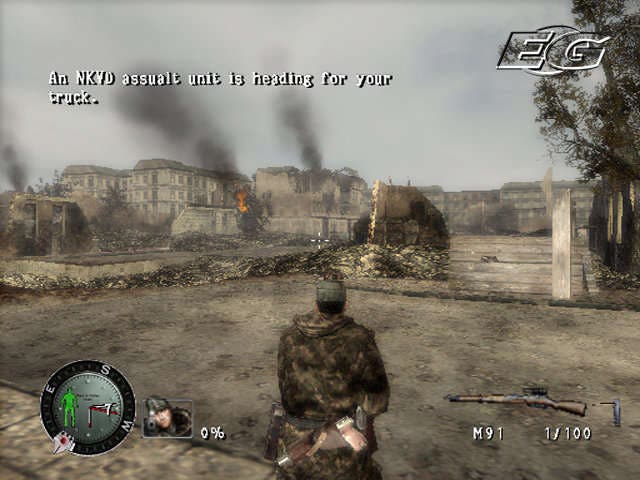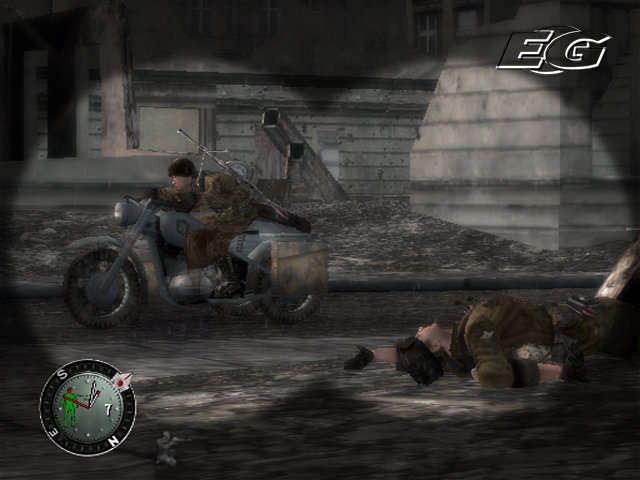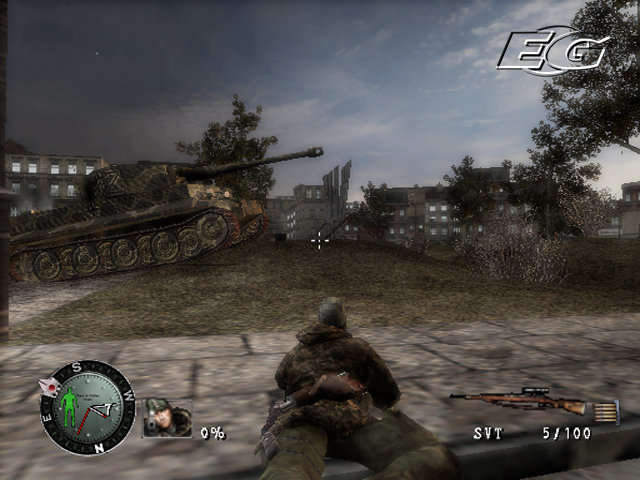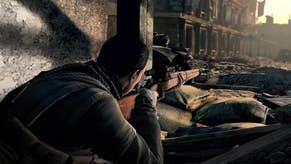Sniper Elite
We knew we'd get around to TIGA's Game of the Year in the end.
When you've got 497,593 World War II games to compete against, it's hard to get anyone's attention, never mind a genre-fatigued reviewer currently unphased by the gurgling death of his nine-millionth fictional Nazi. And when they're buried under a mountain of games that would make Roman Abramovich's pile of cash seem trifling by comparison, it's even more of a task. But! As luck would have it, just when we thought we'd cleared the backlog of unreviewed titles Rebellion's Sniper Elite crawled from the wreckage, its hand stretched out in a last desperate act pleading for one last chance. "I've just won an award!" it sobbed. "I won the TIGA Game of the Year. I'm good! You'll like me!"
In the midst of the now-traditional two-month long videogame release famine, even previously ignored World War II games deserve a chance, especially British-developed ones that have just won unexpected recognition from their fellow developers.
And having chipped through all 28 taxing sniper-based missions, we can see why. It's different. It's doesn't follow the same path as all the other me-too fodder, and delights in giving you the chance to play it as gung-ho or as carefully as you want. We like that.
A chilly old war

The story, though, is typically ridiculous in a way that contrives to fashion a US protagonist, despite it actually focusing on the Russian-German conflict. Basically, we're asked to suspend our disbelief in supposing that right at the end of the Second World War, a crack US OSS sniper has disguised himself as a German to stop those darned Ruskies getting their hands on their nuclear secrets - the kind of advanced weaponry that could tip the balance of world power unfavourably in their direction.
Aside from the somewhat wooly premise, Sniper Elite quickly develops into the kind of covert, slow burn, pick-'em-off-one-by-one experience that gets under your skin the more you play it. Harking back to the best bits of the seminal Hidden & Dangerous, it encourages a more careful, more considered approach that many run-and-gunners might initially find a bit jarring. Placing you in the confines of largely deserted, ruined urban environments, you play the lone hero sent in to disrupt, destroy, eliminate and rescue by whatever means necessary. But once you start ticking off semi-linear objectives and engaging in fairly familiar third person combat, you might be forgiven for thinking 'so far, so familiar', and leave it at that.
The main difference between Sniper Elite and the army of other me-too shooters out there is the need for a heightened degree of tactical awareness. Given that (for virtually the entire game) it's just you against a determined and deadly massed enemy this isn't a game that allows you to get very far by simply charging in and spraying bullets around for fun - at least not unless you want to strip away the spirit and point of the game and play it on easy. But let's be clear: despite the title, Sniper Elite is not a game that forces you to be a sharpshooter all the time; it'd be interminably dull if that were the case. In fact, if you want to simply play it as a traditional third-person shooter, you can. But if taking your time and clearing enemies silently and with surgical precision like a deadly assassin is the role you want to fill, you can do that too.
Crosshair traffic

Although you could legitimately argue that practically every shooter features a sniper rifle at some stage, the fact that it's such an integral focus here allows Rebellion to zone in on the art of sniping in a way that few games have bothered to do. For example, the effects of wind and gravity play a key part in the aiming process, meaning it's not simply a case of lining up the crosshair anymore. The further a target us away from you, the more you have to aim above the target to compensate, and the same applies if a crosswind is likely to steer the bullet away from its intended target. In addition you have to pay attention to your heart rate and stance: if you've been running around, your pulse will be racing and hence your aim will wobble accordingly. Crouching or lying down, catching your breath and using the 'empty lung' technique helps enormously just as you're about send a bullet flying a few hundred metres towards its unsuspecting target. It's a game that really makes you think about how you go about shooting, rather than simply lining up the crosshairs.
But far from getting beardy about the subject, it's a game that's not afraid to make it an exciting spectacle, and just as Max Payne and others delight in showing you a 'bullet cam' when you've lined up a particularly sweet shot, Sniper Elite does the same, to delightfully grisly effect, displaying the full gory results on impact and rewarding players with score multipliers for skillful and unlikely feats of sharp shooting.
Delivering a steady aim, though, is only half the story, and as you'd expect, the life of a sniper depends as much on their ability to remain out of sight. In accordance, the game gives you no end of opportunities to pick off victims unseen through the broken walls of innumerable shattered buildings, peepholes through twisted wreckage, abandoned machinegun nests as well as deadly vantage points - but also doesn't hesitate in returning the favour with interest when it wants to. With such excellent cover for the canny AI to lurk among as well, you'd be completely bamboozled if the game didn't give you some clue as to where the enemy was firing from, so there are a few obvious concessions to realism in the name of fun. Chief of these is the ability to see an approximate 'cone of sound' on your compass, so if bullets happen to fizz past your ears, you'll be able to tell instantly where it came from even without the advantage of surround sound.
Erase and rewind

Needless to say, flesh wounds are an occupational hazard, but patching yourself up isn't quite as free and easy as other games, with even the easiest settings forcing you to be frugal with supplies and search every body for leftover medikits or bandages - not to mention do everything possible to avoid enemy fire in the first place. Admittedly you do get a convenient supply drop at the start of every mission, but it's never one of those games to overload you and make it too easy. You really will fear for your life at every turn, and as such this heightens the sense of satisfaction when you get things right, and serves as a crushing blow when things screw up. Thankfully, Sniper Elite doesn't overdo it in the save-game department either, and the limited number of quicksaves per level also prevents the game turning into a stop-start affair and feels more sensibly managed than merely checkpointing as well, though it does force you into nervously gambling on your ability to make headway ("just round this next corner. Blam. Oh dammit"). As it stands, there's a nice balance between being able to make steady progress and still giving the game a much-needed feeling of tension that games like this thrive on.
As we touched on earlier, in terms of what you actually do in the game, it's pretty standard run of the mill stuff. You know, take out this cluster of enemies, destroy that installation, sneak undetected past those guards, rescue so-and-so. You know the drill. Sniper Elite's recent TIGA award certainly wasn't won on the basis of the startling originality of its premise, but what it does do that's refreshing is give the player more choice than is typical. Choice over the order in which they tackle many of the level's objectives, choice of route, choice of fighting style. It might not strike you initially, but there's much more to this game than meets the eye, and it's a shame that this aspect wasn't pushed more heavily before the game slipped out unnoticed.









